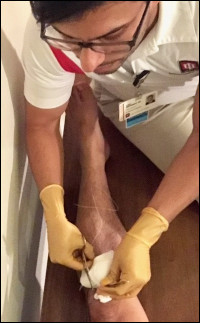Ruben Hernandez, MD: Indiana University School of Medicine FM physician
Nicaragua: January 2017

As the accompanying faculty member on the ENALCE Global Health Elective, I worked for a week with three MS4 medical students and Nicaraguan physicians and public health workers in various clinical settings providing primary and preventive care outreach to the most marginalized adults and children in the community of La Concepción, Masaya.
During the week, the team spent time learning first-hand about Nicaragua’s health care system and worked in a small government run hospital, two publically funded health clinics and did community outreach home visits in marginalized villages surrounding La Concepción. Our team worked tirelessly during the week conducting general check-ups, well-child checks, pap smears, acute and urgent care, diabetes testing and monitoring as well as working with community health workers to deliver educational talks on accident prevention in the home and the importance of breast feeding.
As a physician born and raised in Honduras, I have seen up close the good and the bad that result from outside volunteer medical groups in countries like Nicaragua. While caring for vulnerable populations is important, equally important and necessary is modeling for our US medical student’s cultural humility and teaching the practice of culturally appropriate medical care. Indeed modeling this behavior and mentoring students from this perspective was a personal goal of mine on this trip. If not intentional in helping our students think critically about their experience, trips like this can inadvertently serve to perpetuate biases and negative stereotypes of the host country.
This experience was valuable personally and professionally for me and for the students with whom I worked. I look forward to an on-going relationship with my Nicaraguan colleagues and the opportunity to continue serving and teaching.